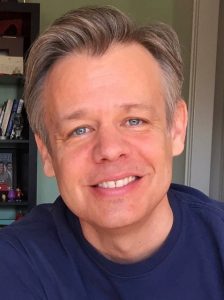Daniel Karslake recalls his childhood at Chautauqua growing up down the hill from the Hall of Philosophy.

“The Hall of Philosophy was always my favorite building at Chautauqua because when I was really little I’d run up the stairs, run past the benches and run to go get bubblegum,” he said. “I later learned that was the place for interfaith dialogue at Chautauqua, and I tried to never miss those lectures. This is super deep in me, and it has been a place for conversation and looking at different ways of belief.”
Years later, Karslake will return to his favorite childhood place — this time on a different side of the podium.
At 2 p.m. Monday, Aug. 20, in the Hall of Philosophy, Karslake will discuss how filmmaking intersects with religion and social issues during his lecture, “For the Bible (& the Constitution) Tells Me So.” Karslake’s lecture is part of the Week Nine interfaith theme, “The Intersection of Cinema and Religious Values.”
Karslake’s 2007 film “For the Bible Tells Me So,” which was screened at the Sundance Film Festival, explores the intersection of religion and homosexuality. The film has been translated into more than 20 languages and has received numerous Best Documentary Audience Awards around the world.
During his lecture, Karslake said he will explore the influence the Institution had on production of his first film.
“As someone who grew up here, Chautauqua Cinema is my home theater,” he said. “The Cinema has always been a place that has had a mission of its own to have popular but very quality message films here. I was always very moved by virtually every movie I ever saw here. Everything comes back to Chautauqua.”
Karslake, who also produced a movie about hunger and poverty called “Every Three Seconds,” is also connected to Chautauqua through the Rt. Rev. V. Gene Robinson, vice president of religion. Robinson appeared in “For the Bible Tells Me So” to offer his experience as the first openly gay Episcopal bishop.
Upon the initial release of the film, Karslake said there was negative pushback from opponents who “clearly had not watched the film and didn’t understand its purpose.” More than ten years later, Karslake said the documentary continues to act as a catalyst for conversation about social change.
Unfortunately, he acknowledges that the conversation is not always positive.
“About three years ago, I started getting death threats again out of the blue,” he said. “I live in Berlin, so my husband and I weren’t tuning into what was happening in the United States at that time. The next day there was a Republican debate… and seven or eight of the candidates were saying some of the most anti-LGBTQ+ things I’d heard in years. I hadn’t heard that in public discourse in America in quite a long time.”
Despite negative pushback, Karslake said his role as a filmmaker is instrumental.
“What tends to come out of the film is much more understanding and hope for kids who are LGBTQ+ and who are growing up in religious environments,” he said. “It’s a message around the world that keeps resonating. The power of film is amazing, I’m in awe of it. It’s a huge responsibility, but I’m lucky.”
Karslake said the intersection of religion and homosexuality continues to be a contested issue, and he is currently working on a sequel film to “For the Bible Tells Me So” called “For They Know Not What They Do.”
At 4 p.m. today at the Chautauqua Cinema “For the Bible Tells Me So” will be screened.




